 Chapter 1.
Chapter 1.
How our fifth combat is against the spirit of despondency, and of the harm which it inflicts upon the soul.
In our fifth combat we have to resist the pangs of gnawing despondency: For if this, through separate attacks made at random, and by haphazard and casual changes, has secured an opportunity of gaining possession of our mind it keeps us back at all times from all insight in divine contemplation, and utterly ruins and depresses the mind that has fallen away from its complete state of purity. It does not allow it to say its prayers with its usual gladness of heart, nor permit it to rely on the comfort of reading the sacred writings, nor suffer it to be quiet and gentle with the brethren; it makes it impatient and rough in all the duties of work and devotion: and, as all wholesome counsel is lost, and steadfastness of heart destroyed, it makes the feelings almost mad and drunk, and crushes and overwhelms them with penal despair.
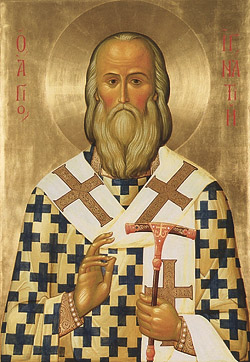 Whosoever will come after me, let him deny himself, and take up his cross, and follow me (Mk. 8:34), said the Lord to his disciples, calling them unto Him, as we heard today in the Gospels.
Whosoever will come after me, let him deny himself, and take up his cross, and follow me (Mk. 8:34), said the Lord to his disciples, calling them unto Him, as we heard today in the Gospels.
Dear brothers and sisters! We too are disciples of our Lord Jesus Christ, because we are Christians. We too are called unto the Lord, to this holy temple, to hear His teaching. We stand before the face of the Lord. His gaze is directed at us. Our souls are laid bare before Him; our secret thoughts and hidden feelings are open to Him. He sees all of our intentions; He sees the truth, and the sins we have committed from our youth; He sees our whole life, past and future; even what we have not yet done is already written in His book.[1] He knows the hour of our passing into immeasurable eternity, and gives us His all-holy commandment for our salvation: Whosoever will come after me, let him deny himself, and take up his cross, and follow me.
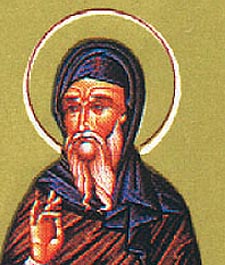 Saint Simeon the New Theologian was born in the year 949 in the city of Galatea (Paphlagonia), and he was educated at Constantinople. His father prepared him for a career at court, and for a certain while the youth occupied a high position at the imperial court. When he was fourteen, he met the renowned Elder Simeon the Pious at the Studion Monastery, who would be a major influence in his spiritual development. He remained in the world for several years preparing himself for the monastic life under the Elder’s guidance, and finally entered the monastery at the age of twenty-seven.
Saint Simeon the New Theologian was born in the year 949 in the city of Galatea (Paphlagonia), and he was educated at Constantinople. His father prepared him for a career at court, and for a certain while the youth occupied a high position at the imperial court. When he was fourteen, he met the renowned Elder Simeon the Pious at the Studion Monastery, who would be a major influence in his spiritual development. He remained in the world for several years preparing himself for the monastic life under the Elder’s guidance, and finally entered the monastery at the age of twenty-seven.
Saint Simeon the Pious recommended to the young man the writings of Saint Mark the Ascetic (March 5) and other spiritual writers. He read these books attentively and tried to put into practice what he read. Three points made by Saint Mark in his work “On the Spiritual Law” (see Vol. I of the English PHILOKALIA) particularly impressed him. First, you should listen to your conscience and do what it tells you if you wish your soul to be healed (PHILOKALIA, p. 115). Second, only by fulfilling the commandments can one obtain the activity of the Holy Spirit. Thirdly, one who prays only with the body and without spiritual knowledge is like the blind man who cried out, “Son of David, have mercy upon me” (Luke 18:38) (PHILOKALIA, p. 111). When the blind man received his sight, however, he called Christ the Son of God (John 9:38).
Our Holy Father, St. Gregory Palamas
Commemorated November 14/27, and on the Second Sunday of Great Lent
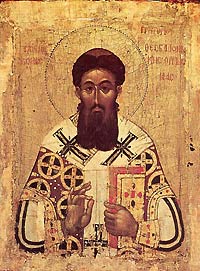 St. Gregory Palamas, one of the pillars of Orthodoxy, was born in 1296, probably to a noble Anatolian family in Constantinople. He and his brother went to Mount Athos in around 1318, and lived in Vatopedi and Esphigmenou Monasteries. Gregory also successfully persuaded his widowed mother, brothers and sisters to become take up the monastic life. With the encroachment of the Turks, he was forced to flee to Thessalonica, being ordained a priest there in 1326. Afterward, he took up the eremetic life at a mountain near Beroea, and eventually returned to Athos in 1331.
St. Gregory Palamas, one of the pillars of Orthodoxy, was born in 1296, probably to a noble Anatolian family in Constantinople. He and his brother went to Mount Athos in around 1318, and lived in Vatopedi and Esphigmenou Monasteries. Gregory also successfully persuaded his widowed mother, brothers and sisters to become take up the monastic life. With the encroachment of the Turks, he was forced to flee to Thessalonica, being ordained a priest there in 1326. Afterward, he took up the eremetic life at a mountain near Beroea, and eventually returned to Athos in 1331.
St. Gregory lived in very difficult times, for many heresies were creeping into the Church, and the Ottoman Empire was ever expanding, taking over Byzantine lands. In the early 1300’s he wrote on the nature of the Holy Spirit, showing the errors of the Latin view while living at the hermitage of Saint Savvas on Mount Athos. He became known as a preeminent theologian early in life, due to his many writings and for his beliefs on hesychasm.
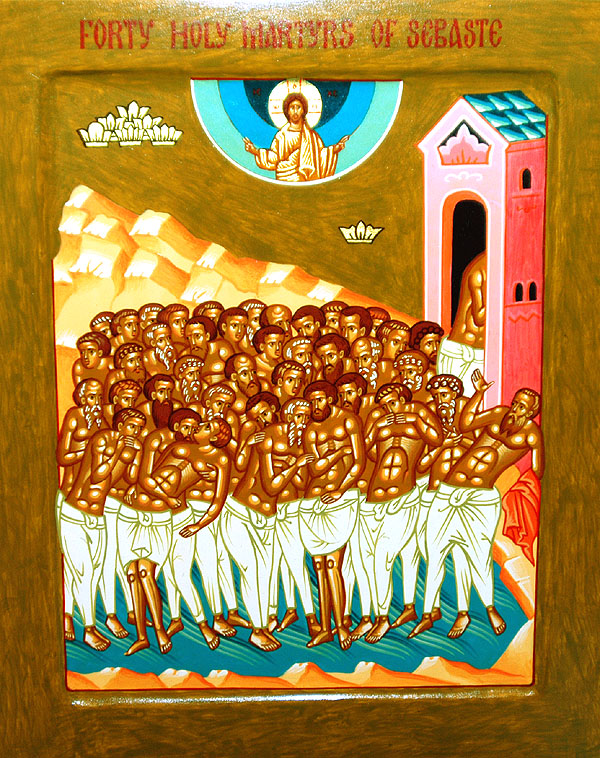 In the year 313 Saint Constantine the Great issued an edict granting Christians religious freedom, and officially recognizing Christianity as equal with paganism under the law. But his co-ruler Licinius was a pagan, and he decided to stamp out Christianity in his part of the Empire. As Licinius prepared his army to fight Constantine, he decided to remove Christians from his army, fearing mutiny.
In the year 313 Saint Constantine the Great issued an edict granting Christians religious freedom, and officially recognizing Christianity as equal with paganism under the law. But his co-ruler Licinius was a pagan, and he decided to stamp out Christianity in his part of the Empire. As Licinius prepared his army to fight Constantine, he decided to remove Christians from his army, fearing mutiny.
One of the military commanders of that time in the Armenian city of Sebaste was Agricola, a zealous champion of idolatry. Under his command was a company of forty Cappadocians, brave soldiers who had distinguished themselves in many battles. When these Christian soldiers refused to offer sacrifice to the pagan gods, Agricola locked them up in prison. The soldiers occupied themselves with prayer and psalmody, and during the night they heard a voice saying, “Persevere until the end, then you shall be saved.”
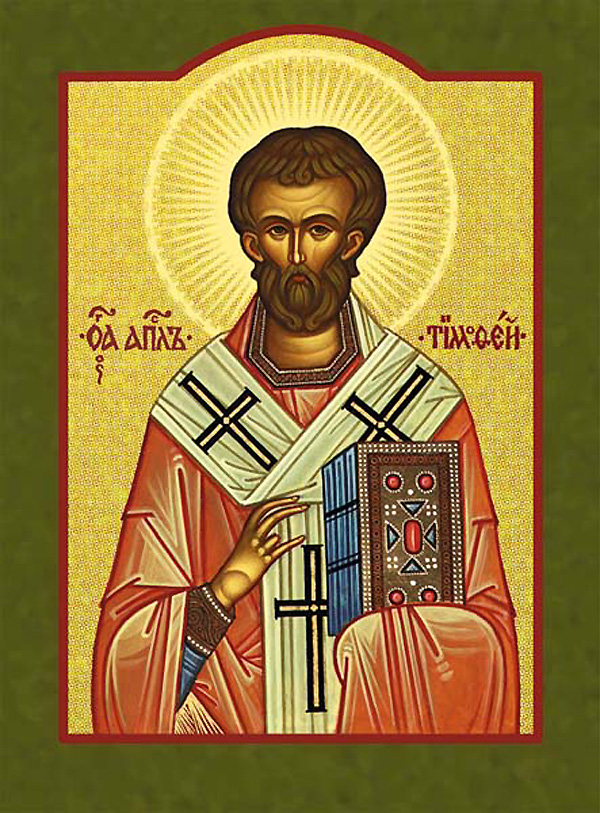 The Holy Apostle Timothy was from the Lycaonian city of Lystra in Asia Minor. Saint Timothy was converted to Christ in the year 52 by the holy Apostle Paul (June 29). When the Apostles Paul and Barnabas first visited the cities of Lycaonia, Saint Paul healed one crippled from birth. Many of the inhabitants of Lystra then believed in Christ, and among them was the future Saint Timothy, his mother Eunice and grandmother Loida (Lois) (Acts 14:6-12; 2 Tim. 1:5).
The Holy Apostle Timothy was from the Lycaonian city of Lystra in Asia Minor. Saint Timothy was converted to Christ in the year 52 by the holy Apostle Paul (June 29). When the Apostles Paul and Barnabas first visited the cities of Lycaonia, Saint Paul healed one crippled from birth. Many of the inhabitants of Lystra then believed in Christ, and among them was the future Saint Timothy, his mother Eunice and grandmother Loida (Lois) (Acts 14:6-12; 2 Tim. 1:5).
The seed of faith, planted in Saint Timothy’s soul by the Apostle Paul, brought forth abundant fruit. He became Saint Paul’s disciple, and later his constant companion and co-worker in the preaching of the Gospel. The Apostle Paul loved Saint Timothy and in his Epistles called him his beloved son, remembering his devotion and fidelity with gratitude.
 Chapter 1.
Chapter 1.
 Whosoever will come after me, let him deny himself, and take up his cross, and follow me (Mk. 8:34), said the Lord to his disciples, calling them unto Him, as we heard today in the Gospels.
Whosoever will come after me, let him deny himself, and take up his cross, and follow me (Mk. 8:34), said the Lord to his disciples, calling them unto Him, as we heard today in the Gospels. Saint Simeon the New Theologian was born in the year 949 in the city of Galatea (Paphlagonia), and he was educated at Constantinople. His father prepared him for a career at court, and for a certain while the youth occupied a high position at the imperial court. When he was fourteen, he met the renowned Elder Simeon the Pious at the Studion Monastery, who would be a major influence in his spiritual development. He remained in the world for several years preparing himself for the monastic life under the Elder’s guidance, and finally entered the monastery at the age of twenty-seven.
Saint Simeon the New Theologian was born in the year 949 in the city of Galatea (Paphlagonia), and he was educated at Constantinople. His father prepared him for a career at court, and for a certain while the youth occupied a high position at the imperial court. When he was fourteen, he met the renowned Elder Simeon the Pious at the Studion Monastery, who would be a major influence in his spiritual development. He remained in the world for several years preparing himself for the monastic life under the Elder’s guidance, and finally entered the monastery at the age of twenty-seven. St. Gregory Palamas, one of the pillars of Orthodoxy, was born in 1296, probably to a noble Anatolian family in Constantinople. He and his brother went to Mount Athos in around
St. Gregory Palamas, one of the pillars of Orthodoxy, was born in 1296, probably to a noble Anatolian family in Constantinople. He and his brother went to Mount Athos in around  In the year
In the year  The Holy Apostle Timothy was from the Lycaonian city of Lystra in Asia Minor. Saint Timothy was converted to Christ in the year 52 by the holy Apostle Paul (June 29). When the Apostles Paul and Barnabas first visited the cities of Lycaonia, Saint Paul healed one crippled from birth. Many of the inhabitants of Lystra then believed in Christ, and among them was the future Saint Timothy, his mother Eunice and grandmother Loida (Lois) (Acts 14:6-12; 2 Tim. 1:5).
The Holy Apostle Timothy was from the Lycaonian city of Lystra in Asia Minor. Saint Timothy was converted to Christ in the year 52 by the holy Apostle Paul (June 29). When the Apostles Paul and Barnabas first visited the cities of Lycaonia, Saint Paul healed one crippled from birth. Many of the inhabitants of Lystra then believed in Christ, and among them was the future Saint Timothy, his mother Eunice and grandmother Loida (Lois) (Acts 14:6-12; 2 Tim. 1:5).